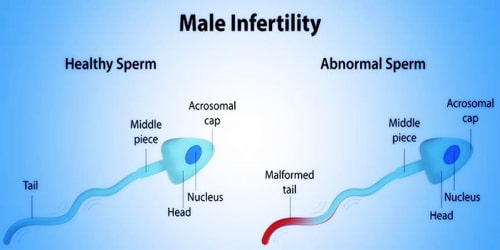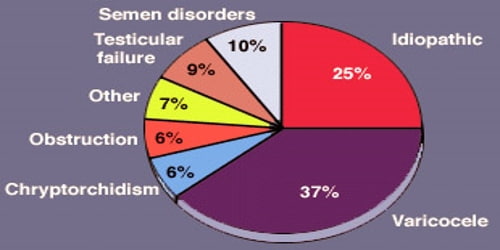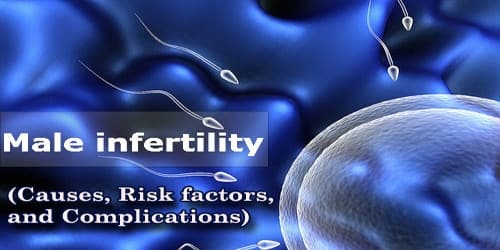Male Infertility (Causes, Risk factors, and Complications)
Definition: Male infertility refers to a male’s inability to cause pregnancy in a fertile female. In humans, it accounts for 40–50% of infertility. Male infertility is due to low sperm production, abnormal sperm function or blockages that prevent the delivery of sperm. Illnesses, injuries, chronic health problems, lifestyle choices, and other factors can play a role in causing male infertility.
According to the World Health Organization and the International Committee Monitoring Assisted Reproductive Technologies (ICMART), failure to conceive is defined as clinical infertility if pregnancy is not achieved after 12 months or more of regular unprotected sexual intercourse.
A man’s fertility generally relies on the quantity and quality of his sperm. If the number of sperm a man ejaculates is low or if the sperm is of a poor quality, it will be difficult, and sometimes impossible, for him to cause a pregnancy. It affects approximately 7% of all men.
Male infertility is diagnosed when, after testing both partners, reproductive problems have been found in the male.

Causes and Risk factors of Male Infertility: In at least half of male infertility cases, doctors cannot identify an exact cause. For the remaining cases, infertility is either due to environmental, genetic or other identifiable factors.
About two-thirds of infertile men have a problem with making sperm in the testes. Either low numbers of sperm are made and/or the sperm that is made does not work properly.
Known causes of male infertility:
Sperm production problems –
- Chromosomal or genetic causes
- Undescended testes (failure of the testes to descend at birth)
- Infections
- Torsion (twisting of the testis in the scrotum)
- Varicocele (varicose veins of the testes)
- Medicines and chemicals
- Radiation damage
- Unknown cause
Blockage of sperm transport –
- Infections
- Prostate-related problems
- Absence of vas deferens
- Vasectomy
Sexual problems (erection and ejaculation problems) –
- Retrograde and premature ejaculation
- Failure of ejaculation
- Erectile dysfunction
- Infrequent intercourse
- Spinal cord injury
- Prostate surgery
- Damage to nerves
- Some medicines
Hormonal problems –
- Pituitary tumors
- Congenital lack of LH/FSH (pituitary problem from birth)
- Anabolic (androgenic) steroid abuse
Sperm antibodies –
- Vasectomy
- Injury or infection in the epididymis
- Unknown cause

Risk factors linked to male infertility include:
- Smoking tobacco
- Using alcohol
- Using certain illicit drugs
- Being overweight
- Being severely depressed or stressed
- Having certain past or present infections
- Being exposed to toxins
- Overheating the testicles
- Having experienced trauma to the testicles
- Having a prior vasectomy or major abdominal or pelvic surgery
- Having a history of undescended testicles
- Being born with a fertility disorder or having a blood relative with a fertility disorder
- Having certain medical conditions, including tumors and chronic illnesses, such as sickle cell disease
- Taking certain medications or undergoing medical treatments, such as surgery or radiation used for treating cancer
Male infertility is more common in environments with high levels of environmental pollution, including water contaminants, pesticides, and herbicides. Some recent population studies have shown that sperm counts have been declining universally even though infertility has not been increasing substantially.
Complications of Male infertility: Infertility can be stressful for both male and their partner. Complications of male infertility can include:
- Surgery or other procedures to treat an underlying cause of low sperm count or other reproductive problems
- Expensive and involved reproductive techniques
- Stress and relationship difficulties related to the inability to have a child
There is usually nothing that can be done to prevent male infertility caused by genetic problems or illness. However, there are actions that men can take to decrease the possibility of infertility.
Information Source:
















